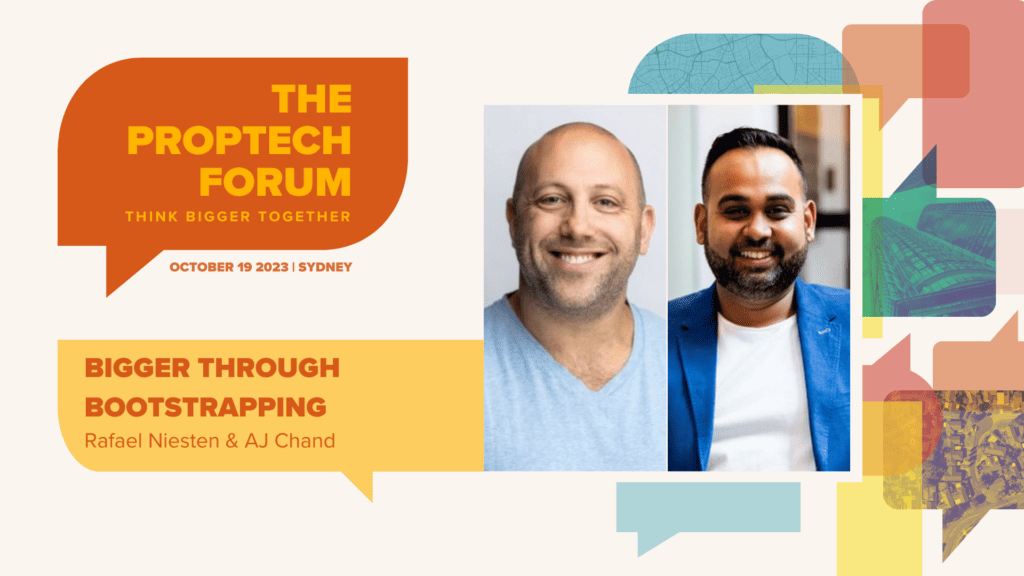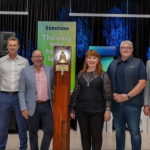While much of the focus in proptech has been on investor funding, what happens when you decide to go it on your own and bootstrap?
Two founders discuss why they made the call to go after sales rather than investors, how they accelerated growth and how it impacted their businesses.
AJ Chand
Well, thank you, everyone, for joining us. I think bootstrapping is one of those topics that always comes up. I think most of the founders would originally bootstrap anyway in some shape or form before you get to at least some level of traction or a product idea or something like that. So most of the famous ones you look at last year and bootstrap to 60 million before they raised any capital, so it can be done. And a lot of founders do use it. So, Raph, thanks for joining me.
Raf Niesten
Thanks for having me. It's always good to be here.
AJ Chand
Yeah.
Raf Niesten
Hello, everybody. Hope everyone's still awake. I know that everyone's sort of draining a little bit, so I'll try and talk a bit louder so you feel more on the live.
AJ Chand
Raph, just tell me a little bit about Bricks and Agent and a little bit about your journey.
Raf Niesten
Yes. So we started Brix and Agent in 2016. I just sold a previous company. We're in the medical space, which was completely different. We grew that business in about four years, from zero to about two and a half million patients. And I got made an offer I couldn't refuse and then they doubled it. And then I decided that it was the end of my journey on the software for medical and I thought, that's it, I'm going to retire now. That's what I did for three weeks, because it's boring. Just so you know, there's only so much time you can spend in a tent with your children before you go completely mental. So it was on the 26 December in 2016 and I had a conversation with a friend that I went to school with. We've known each other since were five. He had sold his business, I sold my business.
Raf Niesten
And we thought, let's start something new. And so we thought, let's do it on Boxing Day, why not? Something to do? So I flew to Melbourne and we sat in an office works boardroom for free and discussed this idea called Bricks and Agent. So we basically started by trying to solve a problem, which was property maintenance. Anyone who's ever had a property, been a tenant, an owner, property manager, a trade, it's disastrous. It's a horrible process. It really sucks. Terrible. So we thought, how do we digitize this? How do we make it better? And I had all these software skills, and John, my business partner, he had all these skills in real estate. So we put the idea together and we formed this little thing called Brixton Agent, and we're in a fortunate position where we both sold a lot of companies, we had money to spare, so we thought, well, let's bootstrap this thing and let's see how we go.

Raf Niesten
And that's sort of the journey and the evolution. And nearly seven years on, we've grown a bit, we've acquired some stuff, we took some investment, which was something we never planned to do, but after four and a half years of paying for everything and everybody, it's the only job in the world that you work 20 hours a day and pay for the privilege. That's what I like to tell people, and I'm sure people in this room share that disposition as well.
AJ Chand
Yeah, 100%. That is exactly how it is. Right? You are paying for the privilege to work in a company. It's always paying out and not getting anything back, especially at the initial stages. So that is probably one of the cons. But what are some of the pros? What do you think one of the.
Raf Niesten
Pros of bootstrapped? Look, you have full control, so you can do whatever you want. It's your business. You make mistakes, you fail, you start again, you pivot, you move on to the next thing, you try things. Whereas if you've got money, people want to know, well, when am I getting my money back? What's my return? What's your roadmap? How much money you're selling to this particular piece of your product roadmap? What are you going to do around this? Tell me about your profit and loss. And you sit there going, I tune out from all that stuff. I like to build things, so that's my area of expertise. I build stuff, I come up with ideas, I iterate on them. And when you bootstrap, you have that full control. So you say today, well, you know what? Let's try this. If it fails, oh, well, so by try something else.
Raf Niesten
And that's what we did. So we built this business, we grew, we partnered with a whole heap of people, we knocked on doors, were hungry, always to keep pushing because we didn't have the influx of capital. It was our own money, so we had to keep pushing forward. And if we hadn't had that hunger and that drive, and we'd taken other people's money, we probably would have relaxed a little bit, taken our foot off the pedal. We've got someone in the back pocket, it's cool, we've got another opportunity to make money. But we treated every dollar as if it was our own, because it was our own and we had no choice. And if we stuffed up or we had to make a decision, we knew that it was coming out of our pocket, so we had to keep pushing and driving forward. And I think that's something you don't get when you get money from investors, although you should treat it as if it's your own, it's not really your own.
Raf Niesten
And if you go down and make mistakes and you fundamentally run out of money or your strategy changes, what ends up happening is you end up owning less and less of the company, and at some point in time, you may not own enough to keep control. In which case, sayonara, for your five, six years worth of woodwork, And I've seen it happen time and time again to a lot of people that I know.
AJ Chand
Yeah, and Tom touched on that before as well. Once you get to a certain level of equity and you're not getting paid to be, then where's the incentive? And most of the founders are driven by the hunger to keep driving customer growth, user growth, and make product roadmap decisions based on that the cherry at the end. Right? And Tom touched on that, and that is very valid. Obviously, there's pros to bootstrapping, but there's also cons a lot of sleepless nights every time you have to pay out your payroll. It is very difficult because it's your own money. So at what point did you decide to take capital? When do you think it is right to take capital?

Raf Niesten
Yeah. Well, I think to that know, Mike Tyson said it pretty well that everyone has a plan until they get punched in the face. And in this business, we've been punched so many times, I barely have recognizable through COVID, our development teams in Sri Lanka, and they had a meltdown and government failure and no food and no lights, and every day is a jammer and a challenge. But you ride that roller coaster of life, you sort of get to a point where you grow to a level where you think, you know what, I've actually got a business that is investable, and I'm going to get paid some decent money. And we had outreach after outreach because we grew organically for quite a long time. And then we decided, let's entertain some discussions. So we held some discussions with some people, and we chose some people we thought would add significant value to what we had.
Raf Niesten
Offering just to take dumb money or invest the money or you're one of 250 companies doesn't help you because you're just one of many. So we looked for some investors that were going to add value, and they approached us, and they had approached us for a long time, and we kept rejecting them. The best thing you can do to investors, by the way, is keep rejecting them. They hate it more than anything else. So just as a tip for you, they keep coming back with bigger buckets of money. Just so you know, that's happened multiple times. So then we got to the point we said, you know what? Yeah, we've had enough of pumping our own cash into this thing. We've got to a point, it's stable, it's growing, we've got a plan. It's not bullshit in excel. It's true. And then we said, okay, we'll take the money.
Raf Niesten
So we did, we took some money, we took just over $9 million. Most of it we took. We put a bit in the company, which was quite nice, and then that just changed the dynamic. We had funds in the company, weren't putting money anymore, and we changed our focus from looking to be invested in to investing in others. And in the last nine months, we purchased two companies, one of whom was from a very large set of insurers who didn't really do well in the software space, go figure. And another was from a group that was looking to exit. So as a result of that, went from a tiny startup seven years ago with nothing to probably having just over one in two rental properties using one of our platforms that we operate today. So we've got about 1.3 million properties that sit one of our platforms and we've got over 5 million users.
Raf Niesten
So went from a very small little startup to a very big organization in a very short period of time, and I'm talking sub two years, we did 2021. We raised the money at the end, so it added the fuel to the fire, it added credibility. And had we not done the first step, which was bootstrapped, we would never have got to that investment level where people were interested and they were of the size and scale that was exciting to us and the market. And then subsequently that extra capital that we had in bank, we used to purchase other assets that then further extended our reach into the market, which was something that we hadn't anticipated happening. So, yeah, I hope that answered the question in a long way. It did.
AJ Chand
And I think it's important to note when you have a couple of co founders and you sit down and you want to start an idea right. And you know it's going to be bootstrapped. I think, in my opinion, bootstrapping replaces the precedes at some point, and then you get to the seed level. And I think that's where a lot of the challenges are, getting co founders. And imagine pitching to two or three, maybe a technical co founder or a marketer that you want to join your team and going, yeah, we're going to start something. We're going to work more than full time, which is about eleven to 12 hours a day. Every waking minute added another 11 hours.
Raf Niesten
Mate, that's where I normally go. Yes.

AJ Chand
And you have to put your own money into it. So it's a big ask. And then I think the funding has changed as well. We were able to fund precede startups before at our idea stage, but right now I think the VCs are more looking for the funders are more looking for traction, they're looking for revenue, they're looking for, ideally, profitability.
Raf Niesten
Right? And that's changed a lot in recent times because obviously the financial cris and recessions and all this global drama. Cost of money is more expensive now, so it's harder for people to actually get decent money these days, and people are taking down rounds and all sorts of stuff because they've spent their money too quickly. So being conservative and bootstrapping is not everybody's cup of tea. It's a much longer journey, but once you get to the end of that journey, it's much more successful if you can make it to the end. The longer you can hold on to your shares, the more they become valuable in the long run. So I think my caveat to that is, obviously you work bloody hard, there'll be a lot of sleepless nights, but once you get there, and if you get there, the rewards are much greater than if you were to sell a huge amount up front.
Raf Niesten
And I think people go into these things, especially in the US, where they say, well, I'm going to get my precede, my seed, my Series A B, blah, blah. All that stuff never made sense to me. I'm an old school thinker. I build a business to make money. I don't build a business to build revenue. I think, what do they say? Revenue is sanity and profit is sanity. So always try to reach for that cash, because that's what keeps you going. And if you have COVID and you get punched in the face multiple times, which you will, you've got that bankroll to keep you going. You haven't spent all your money, you haven't employed 500 people, you've done eleven jobs yourself because you've had no choice, because that's what you set yourself up to do.
AJ Chand
Yeah, I think especially from a product perspective, when you look at founders that are putting their own money in, you have to make every dollar count. You have to make sure that you're doing as many experiments as you can, as quickly as possible, to get to the product market fit, to then get to customers and to get to revenue, and you're investable. I think a lot of people miss that part. So once you do take capital at the initial stages, then the risk of building something that's not required, or building something and putting capital into it, growing a development team too fast, building a whole bunch of features, then you have to scale down anyway, because you probably wouldn't work. So there's a lot of psychological with bootstrapping and taking capital, I think it's a psychological game. It gives you two different sort of dimensions.
AJ Chand
So just for all the founders that are in here, that are bootstrapped, how do you look at them and sort of go, how do you sleep at night? How do you keep your sanity through the whole bootstrapping process?

Raf Niesten
The key is just don't give up. I see faces in this room. I knocked on their doors thousands of times. I can see them smiling at me now. I think someone told me once that I was the most persistent motherfucker they've ever met in their life. And I said, well, that's just the DNA that I've got installed because I'm hungry. I want this to succeed. And people have spoken. It's about human relationships, about connecting, having a beer, having a chat, not just punching 50 emails to someone, go knock on their door, say hello. We went on Shark Tank, right? No such product on Shark Tank ever. In the past, went on there for free PR. We didn't want their money, but we got free PR, and that opened so many doors you wouldn't believe, even if I told you. That opened the biggest door for us, because one of the guys that worked for the shark that invested in us, he actually saw the show and he ignored me for six months.
Raf Niesten
The day after, he said, I saw you on Shark Tank, you should come in and have a chat. What did it cost us? Nothing. My co founder hated it. Shit scared. He hated to be on the TV. I told him to look at the back of the room. If he felt nervous, don't look at the sharks. So he did and they said, hey, the back of the room is not going to give you a deal. We are. So it was bad advice. Terrible bad advice, but it was fun nonetheless. We had a great time doing it. But you've got to put yourself out there. You've got to push harder than you've ever pushed before and you got to drive those boundaries. Interestingly, when we did our little cap raise, the guy that was going to invest in us on Shark Tank, and we said no, invested that at 35 times more than what were supposed to get on the show.

Raf Niesten
So just be persistent, never give up, and just push as hard as you can, because that's all you can do. You got no choice. And if you want to make a success of it, that's it. Push hard, go hard, have fun, do it with a bit of a smile and be prepared for a bloody long journey and to get punched in the face. A.



